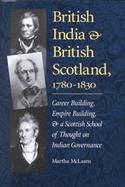Exploring the interwoven careers of the three men, McLaren presents a new perspective on their deliberate use of Indian language skills, Indian knowledge, and articulately written reports to gain promotion, revising the orthodox representation of their school of thought as largely pragmatic and conservative.
This book provides a new argument about the way Munro, Malcolm, and Elphinstone pursued career objectives and, more important, revises the existing orthodoxy on what influences defined the character of their approach to Indian government. McLaren's work will further the understanding of British imperialism in South Asia in the late eighteenth and early nineteenth centuries. It will be of specific interest to scholars engaged in the study of intellectual trends in both British colonial South Asia and Britain itself.


